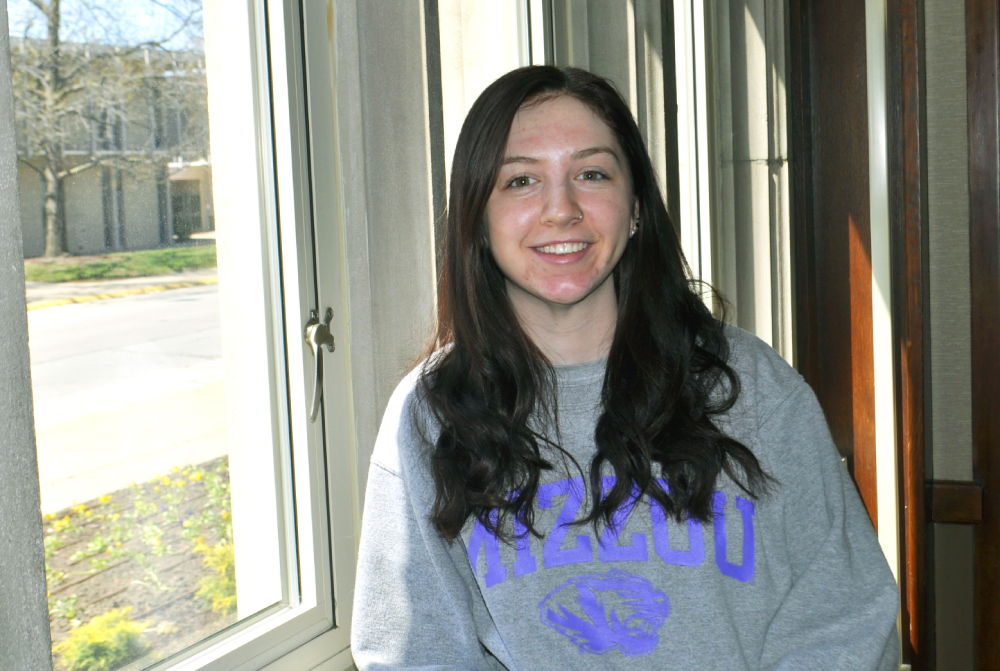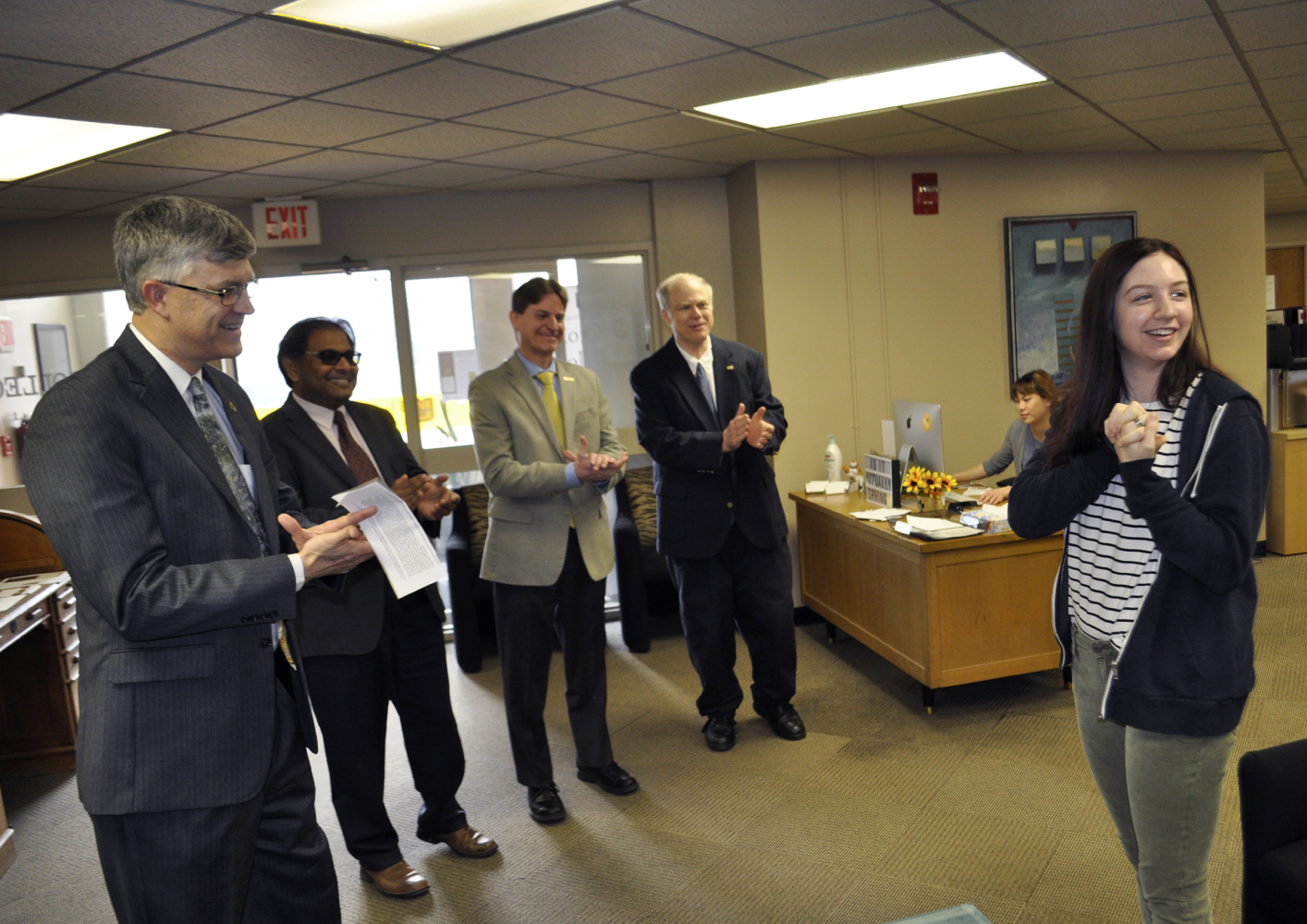Published on Oct. 10, 2018

Taken out of an abusive home, Rachel Patteson lived in orphanages and foster homes as a child. She was homeless during much of her high school years and then had money stolen from her by people who were supposed to help her recover from the prior hardships. Through it all, Patteson never lost the determination to find success.
“I tried my hardest to succeed in school and get good grades,” she says. “I saw that as my only way to succeed and pursue my passions.”
Those passions include conducting research—specifically, conducting research on climate change. Thanks to the Mark Twain Fellowship, Patteson will spend next year conducting research and studying paleoceanography and climate change at University College London, home of one of the world’s best earth science programs.
A stormy upbringing
For much of her childhood, beginning at the age of three, Patteson lived in foster homes and orphanages. Her parents were abusive, her dad spent time in jail and her mother ran away. At the age of nine, Patteson moved from Montana to Louisiana with her mother, who was back in the picture.
Hurricane Katrina hit the Gulf Coast soon after Patteson’s move to Shreveport, Louisiana. As the storm made landfall, Patteson tried to comprehend what was taking place.
“The worst I experienced in Montana was a seven-foot snowfall,” Patteson says. “I wasn’t ignorant to what was happening, but I was young so I don’t think I fully grasped what was happening.”
Far enough inland, Shreveport avoided major destruction from the hurricane, but thousands of people migrated north to escape the devastation. Many of these people were already poor, but lost more when the hurricane hit, forcing them to live on the streets.
“I vividly remember driving down the interstate and all of these families are lined up along the interstate because they had nowhere to go,” Patteson says.
The image of people living on the streets resonated with her because she understood what living in poverty and not having a home to go to was like.
“I grew up poor,” she says. “I lived in a broken down trailer. If I had lived farther south when Hurricane Katrina hit, I would be in the same situation as them. So, I could connect with those people.”
Little did she know that eventually she would also be homeless. Patteson made the move to Louisiana to escape the troubled life that she had lived in Montana. However, the abuse continued and four years later, her mother kicked Patteson to the streets.
“I was homeless,” Patteson says. “I was bouncing between homes.”
She stayed with someone she refers to as more of an acquaintance than a friend. However, abuse took place in that home as well. She moved in with another person, but the challenges did not stop. Patteson had received some dependent financial support after her father, who had spent time in the military, passed away. However, the people with whom she lived stole that money.
Yet Patteson remained determined to succeed. She graduated second in her high school class and received multiple college scholarships, meaning she could once again look for a new start in a new place. That place was Mizzou
Tackling climate change
As a high school sophomore, Patteson learned about climate change. The memories of Hurricane Katrina and those affected by the storm remained in her mind. She read books about the environment and climate change. A passion developed, not only for the science involved, but for the way climate change affected communities, including the people Katrina pushed out of New Orleans. Patteson realized she could make a difference.
The academic success she achieved in high school and the scholarships that resulted made college a possibility. While exploring options, she found MU’s Soil, Environmental and Atmospheric Sciences program.
“The program attracted me because of how it combined soil, environment and atmospheric science,” Patteson says. “For climate change studies, it is important to have all of these areas.”
Patteson arrived at Mizzou ready for a new start and ready to explore the world. Along with an interest in the environment, she had developed a curiosity about Korean culture and language.
“In high school, the two main languages you get to pick from are French and Spanish,” she says “I just never found interest in studying those.”
She stumbled upon a video that was in Korean and it captivated her, so she decided to teach herself the Korean language and started to learn more about Korean culture.
“I like the community aspect of the Korean culture,” she says. “They have a big collective family importance to their culture that I liked. The combination of learning and loving the language and diving into the culture extended my desire to study more Korean in college.”
Once at Mizzou, she knew she wanted to study abroad and Korea was at the top of her list of places to visit. In 2015, she got a first-hand look at the Korean culture after receiving the Benjamin A. Gilmore International Scholarship to study in South Korea.
To properly study the climate, Patteson knew she needed to experience different environments. She followed the trip to South Korea with trips to Russia and Alaska, studying the environment on both excursions. She was drawn to the Arctic and the impact of climate change on that area of the world.
In Russia, she participated in a month-long program examining how climate change affects permafrost and learned about the engineering taking place to combat the changing permafrost and the effect on infrastructure in the local communities. The following summer, she applied for and received a National Science Foundation Research Experience for Undergraduates to Alaska. She conducted her own research project, examining how an increase in storm events affected the ocean in the Arctic and the impact that had on sea ice melt and ultimately the community.

Vice Provost for Undergraduate Studies Jim Spain (left) surprised Rachel Patteson with the announcement of her selection as the recipient of the Mark Twain Fellowship.
The Mark Twain Fellowship
As an MU senior, Patteson applied for Marshall, Gates-Cambridge and Fulbright scholarships. She was a semifinalist for a Fulbright and a finalist for the Gates-Cambridge Scholarship, but was not selected. Once again, Patteson faced a challenging situation undaunted. She learned about the Mark Twain Fellowship and applied.
The Mark Twain Fellowship, an MU-sponsored award, provides support to Mizzou students and recent alumni seeking to pursue graduate study abroad in any discipline. It covers full tuition and fees at a foreign university and offers a stipend for housing, other living costs and transportation. Individuals who apply for nationally recognized fellowship programs, and are not selected, qualify to apply for the Mark Twain award.
Patteson went through the application process, did the interviews and waited. On April 11, Interim Provost Jim Spain surprised Patteson by announcing her selection as the 2018 Mark Twain Fellowship recipient. With the award, she will attend University College London to study paleoceanography and climate change.
A drive to succeed
Patteson has had very little contact with her mother in recent years and calls the relationship “complicated.”
“I had to learn to let the toxic people out of my life, even it if was my family,” she says. “That is something I am still learning to do; I want to keep going back.”
She admits that it is “kind of fascinating” what she has accomplished despite the challenges she has endured.
However, she is not surprised by her achievements.
“I definitely have had the motivation and the drive since high school to want to understand different cultures and have different experiences,” she says. “I can believe that I’m here right now. It comes from the opportunities that I have had here on campus, and from the people who supported me all this way. And, honestly, some of it was lucky; I found the right opportunities at the right time.”